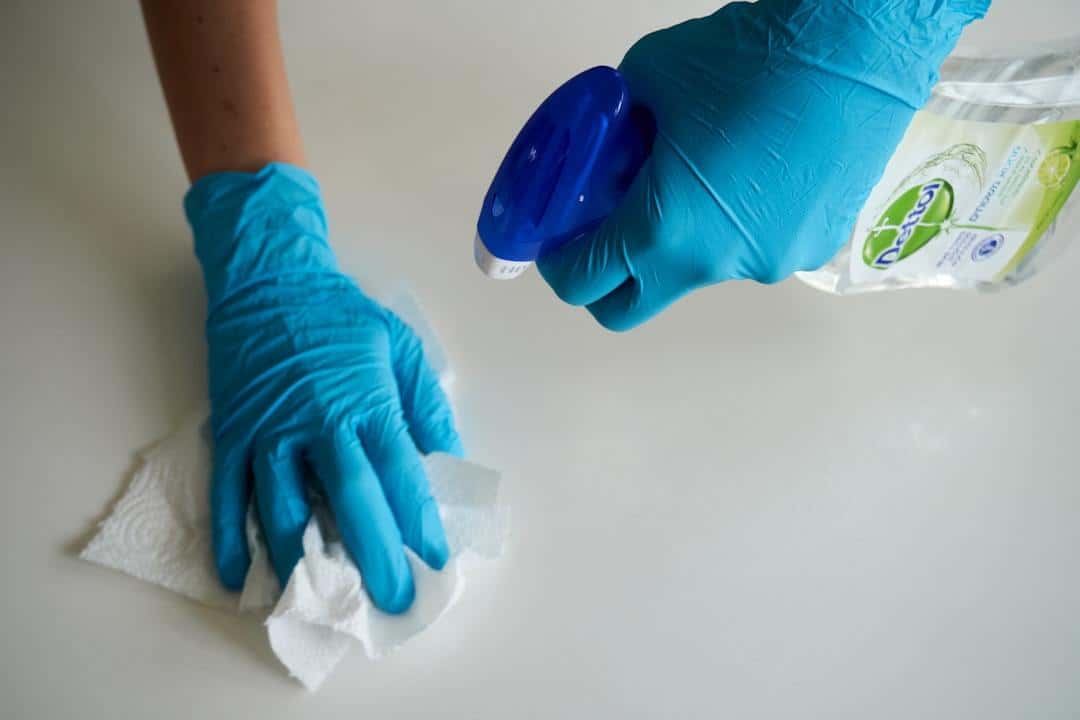They say that business is a way to financial security and personal fulfillment. But what business should you venture into? These days, owning a cleaning service is a good one since it has a low startup cost and has the potential for recurring income. And we got your back if you’re looking for a guide on how to start a cleaning service.
Especially since the demand for professional cleaning services is high, starting a cleaning service business now is perfect. You can invest with a small budget and gradually build a client base.
So keep reading since our guide on how to start a cleaning service—one of the best business ideas out there—will help you create a roadmap to achieving success in your business.
How to Start a Cleaning Service: A Step-by-Step Guide
Success is possible if you know how to start a cleaning service. Without the proper foundation, you may have a hard time earning from your business. So, how should we start?
Step 1: Develop a Comprehensive Business Plan for Your Cleaning Service

A business without a plan is prone to failure even if it’s just a side business idea. Without a solid plan, what would guide your decisions or steer your company toward prosperity?
Thus, you need a well-crafted plan before anything else.
If you have a solid plan, you’re more likely to have clarity and focus. Since you have thought through every aspect of your business, you can refine your vision and identify potential roadblocks.
Moreover, a business plan is necessary before you can secure funding. Potential investors or lending institutions will know that you’re serious, competent, and viable.
Still, from a financial perspective, your plan can also help you project your startup costs, ongoing expenses, and potential revenue. All of these are essential so that you can secure funding if necessary and ensure profitability.
Although your business plan should be specific to your venture, you can still use a similar structure to the general one. It must contain the following:
- Executive Summary: Here, highlight your goals and unique selling points in a concise overview of your cleaning service.
- Company Description: You should have the specific details of your cleaning services, target market, and competitive advantage.
- Market Analysis: A plan should also include research on customer needs, competitor analysis, and the local cleaning market.
- Marketing Strategy: Detail how you want to attract clients, from ads to promotions. You must also include pricing.
- Management Team: Showcasing your team can help build trust, especially with investors, since they can have an idea of your team’s qualifications and experience.
- Financial Projections: Estimate startup costs, operational expenses, and projected revenue for a set period.
Your business plan is a living document, so make sure to adapt to market changes. Although the plan is to guide you, you must revise it as your cleaning service grows. What’s important is to have a detailed business plan, as it can guide you to make data-driven decisions about marketing, pricing, and expansion.
Step 2: Choose Your Cleaning Business Structure and Register Your Company
The next step in starting a cleaning service business is choosing your business structure. You can choose from sole proprietor, partnership, or limited liability company (LLC). Before deciding on a structure, you must understand its pros and cons since each option varies.
- Sole Proprietorship: This business structure is best for startups because it’s the simplest and most common. If you want to have complete control over your cleaning service business, being a sole proprietor is best. However, this means being personally responsible for any debts or legal issues that you may encounter along the way.
- Partnership: Need help dealing with legal issues on your own? Similar to a sole proprietorship but shared by two or more people, you can split liabilities between two or more people with a partnership business structure. However, you need to ensure that you have a detailed outline of your partnership agreement, roles, responsibilities, and profit sharing.
- Limited Liability Company (LLC): What about protecting your personal assets? LLC offers liability protection—in case anything goes wrong, your personal assets will be protected, whether that be lawsuits or business debts. However, this structure requires more setup—paperwork and fees—and ongoing maintenance.
You need to consider your personal financial situation, risk tolerance, growth aspirations, and other factors before deciding on the best business structure. As a business degree holder, here’s my take on what structure, depending on the factors to consider:
- Starting Small? If I operate my business independently, I’d choose a sole proprietorship, especially if I have a limited risk tolerance. However, I’d consider an LLC when my business grows.
- Sharing the Load? If I have to operate with a cleaning expert, I’ll choose a partnership. This means having a partner who can bring complementary skills from marketing to accounting. Leveraging each other’s strengths is excellent, significantly if such skills can help the business grow faster.
- Seeking Protection? Since an LLC offers the best liability protection while allowing flexibility, I’d choose this structure for peace of mind and potential growth.
If you’re going to take in employees, you might as well decide now on their payment method. Will you pay them the same-day? Pay them per job order? Give them a fortnightly salary?
But the best advice I can give on this is to consult with a lawyer or accountant. Why? Their expertise is vital to ensure that you comply with all the legalities side of your business. It’s better to start on the right foot than face liabilities later on.
Step 3: Obtain Necessary Licenses, Permits, and Insurance for Your Cleaning Business

Once you have a structure in mind, it’s time to acquire your cleaning service business licenses, permits, and insurance. These are the legal requirements that you need before accepting those first cleaning jobs.
You can obtain a business license from your county or city before operating your business. Besides such a license, special permits may also be necessary. For instance, if you’ll be offering pressure washing services, you would then need an environmental permit for wastewater disposal.
Insurance is a must for any cleaning business owner, and you can have more than one.
If your crew or anyone gets injured on a job site or you accidentally damage a client’s property, general liability insurance is best. Another is to consider property damage coverage in your policy since the nature of your business is working in someone’s office or home.
By having liability insurance, you can protect your business from potential lawsuits and financial losses.
You may also want to consider worker’s compensation insurance if you’re hiring employees. Or commercial auto insurance to cover vehicle expenses if your employees are driving a company vehicle.
Insurance appears to be an unnecessary expense when you’re starting—I know, and I understand what you feel about it. However, would you rather have peace of mind or face liabilities when accidents happen?
Your general liability policy can save you money over the years. Of course, it relies on the provider’s coverage. Thus, it’s vital to shop around to find a reputable provider that can cater to the unique needs of cleaning businesses.
Step 4: Invest in Essential Cleaning Supplies and Equipment

Once you have all the legalities set up, it’s time to invest in quality cleaning supplies and equipment—all are essential for a successful cleaning business. By having the right tools, you can deliver outstanding results.
While you can get the most advanced tools out there, remember the essential components: equipment, software, and furniture. Ensure that you have all the stocks, especially these:
- Vacuum cleaner
- Mop and bucket
- Broom and dustpan
- Microfiber cloths
- Sponges and scrub brushes
- Protective gloves
- Cleaning solutions (all-purpose, glass, bathroom, floor).
- Trash bags
- Caddy or tote to carry supplies
These are only the essentials when getting started on how to start a cleaning service. You may still need additional tools, depending on your specialized services or niche. For instance, you may want to have floor buffers for high-traffic areas, window squeegees for sparkling windows, or steam cleaners for deep cleaning upholstery or carpets.
Don’t skimp on your cleaning supplies and equipment because quality matters! Once you have these tools, you can showcase your professionalism while improving your cleaning efficiency. It’s worth the investment, I should say.
Once you deliver exceptional cleaning results, you can build a strong reputation—vital for startups—so that you can be at par with, or even better than, your competitors.
Step 5: Establish Your Pricing Strategy and Service Offerings

You’ve spent on your tools, so you may now have an idea of how much your startup costs are. Use those when establishing your pricing strategy.
It may be a challenging step, but knowing how to price your cleaning services is essential to avoid bankruptcy. Remember your startup costs? That’s a start, but not the end, because you also need to ensure that the price will attract customers without sacrificing your own earnings.
To cater to various customer needs, you may want to consider the range of pricing models that cleaning companies employ. That way, you can offer the most suitable price for your target customers.
Pricing Model Description
Hourly rate: If this is your first time, I recommend using this model. By charging by the hour, you can also get a feel for how long different tasks take.
Flat rate: Here, you’ll charge for each cleaning service regardless of how long it takes. A set price is suitable if your target clients want predictable costs.
Square footage: If your cleaning services extend to commercial spaces, you may want to charge based on the size of the space. That way, you’ll receive payment according to the size of the space since commercial spaces require more time, cleaning supplies, and staff.
When setting your prices, ensure that your supplies, labor, and time are taken into account. Of course, don’t forget to consider your desired profit margin.
Tiered Pricing and Market Positioning
You may also consider the following pricing model, especially if you have a diverse target clientele. This is beyond a one-size-fits-all because you can tailor your cleaning services, capturing a wider audience and staying ahead of the competition:
- Multi-Tiered Pricing: With tiered pricing, you can segment your services into various packages with varying features. This pricing can cater to clients with different needs and budgets. And how does it work?
- Bronze Tier: This basic tier is perfect for clients with tight budgets or who just want a quick refresh. It includes essential cleaning tasks like dusting, vacuuming, and mopping floors.
- Silver Tier: In addition to the essentials from the bronze tier, you can offer a package with cleaning bathrooms and kitchens, disinfecting surfaces, and potentially even laundry pick-up/drop-off.
- Gold Tier: This premium tier offers deeper cleaning services, including carpet cleaning, window washing, or oven cleaning. As a result, you can cater to clients who need a more comprehensive cleaning.
When you clearly outline each tier’s features, you can effectively attract the right clients—this is known as targeted marketing.
How? If you’re looking for busy professionals, you can use your Bronze tier, highlighting the “quick and affordable” aspects. Want clients seeking a more thorough cleaning? Emphasize the “deep clean” benefits of the Gold tier.
By doing so, you can strategically position your services to attract a broader range of clients.
Step 6: Create a Marketing Plan to Attract Clients for Your Cleaning Business

Besides a business plan, you also need a solid marketing plan. Here, the purpose is to reel in potential clients by creating a buzz about your services. You can use your marketing plan as a roadmap to showcase your unique value proposition and reach your target audience.
That’s why it’s vital to create a winning strategy, and here’s how:
- Know Your Ideal Client: Before detailing your marketing tactics, you must first identify and understand your ideal client. Are they property managers, families, or perhaps busy professionals? When you know who you are trying to reach, you’ll know how to tailor your marketing campaigns and what marketing channels to use.
- Identify Your Marketing Mix: Besides the target audience, you should also identify the tactics and various tools to reach your market. These are known as the marketing mix as follows:
- Online Presence: One of the best ways to establish an online presence is to create a user-friendly website and social media pages. With your site, you can showcase your services, pricing, and testimonials. As for social media platforms like Facebook or Instagram, maximize it to showcase your work via short reels or stories.
- Local Advertising: Since your target market is in your locality or neighboring cities or towns, you should also consider targeted online advertising. If you want, you can also add print ads in community newsletters or local newspapers. That way, you can reach potential clients within your service area.
- Networking: Besides online marketing, you should also contact property management companies, realtors, and businesses in your locality. Connect with them and offer referral programs to generate leads, which can be a big help, especially if you’re a startup.
- Word-of-Mouth Marketing: As for this, you first need to deliver exceptional cleaning services to your first clients. Once satisfied, they’re more likely to refer your business to their families, friends, or acquaintances—free marketing!
- Develop a Compelling Message: Once you have a clear understanding of your audience and what marketing mix to apply, you can start crafting messages. These messages should be clear, concise, and compelling enough to encourage target clients to visit your site or social media channel. Moreover, your messages should highlight the benefits your clients will receive when they hire you or emphasize your unique selling points, whether that’s exceptional customer service or eco-friendly cleaning practices.
- Track and Analyze: To determine what marketing strategy is working, track and analyze results. This helps you understand what strategy attracts clients and brings in return on investment (ROI).
- Embrace Flexibility: What if your marketing strategy isn’t working? Well, we experience that at times, so that’s normal. What’s not is still imposing it and waiting for a miracle. If it’s not working, refine it or drop it. That way, you’ll be using your time, effort, and money effectively. There are other marketing channels and strategies out there, so don’t limit yourself to what others are using.
Your cleaning service is unique, so make sure that your marketing strategies align with your business goals and objectives. This will allow you to build a strong presence in your service area and attract a loyal clientele.
Step 7: Build Your Business Image

They say first impressions last, and that’s also true in business. Whether your business is online or brick-and-mortar, you need to ensure that it gives a good impression. This is vital so that you can build your business image even through tiny details.
Potential customers will find these details in your logo, business cards, uniforms, social media, and sites. That’s why you need to establish your branding—your brand should be shown all over your media channels.
For instance, if your cleaning service uses eco-friendly materials, then green would be a better theme color.
Other factors that affect your brand image is how you or your employees interact with your clients. Ensure that anyone representing your brand should be punctual, friendly, and thorough. Moreover, anyone must go above and beyond your clients, as it can affect how they see your company.
As they say, the little extras can make or break your business. People are more likely to keep booking your cleaning services if they have a positive impression of your brand. And this works vice versa.
Step 8: Build a Strong Online Presence and Network with Local Businesses
As mentioned, an online presence is essential for your cleaning service business to succeed. We also said that user-friendly websites and social media profiles are crucial for establishing an online presence. Thus, making it a good one should be a priority.
Another way is to use online directories. Those are just like the yellow pages of businesses before, where we can find their telephone numbers. Turned to online directories in this digital age, a local business can have a more substantial online presence if it appears on Google My Business, Yelp, and Angi.
Since we can search for almost all our needs these days, we need to be in those directories, too. Especially since these third-party sites are experts in listing businesses, people are more likely to have a good impression of your cleaning service if it’s listed online.
Having an online presence and a good network with local businesses can also help. They can be ideal referral sources for your cleaning business since they’re experts in matching homeowners with their needs.
And who are they? Go talk with your local home service providers, home stagers, and realtors. Connecting with these experts in your community can build your connections.
Step 9: Hire and Train Reliable Cleaning Staff as Your Business Grows

Offering your cleaning service on your own is a start, but it shouldn’t be the end game. You shouldn’t be happy if you can handle everything on your own—from marketing to actually performing the cleaning services.
That scenario may mean two things. One, you’re declining other clients to accommodate all your bookings since you’re a one-person team. Or worse, your client base isn’t growing.
The remedy is to avoid canceling bookings. Some clients may find other cleaning services that can cater to them if you keep on rescheduling or canceling their bookings. That’s why hiring reliable cleaning staff is the key—which could also mean your cleaning business is growing.
You know you need to scale up your house cleaning business if you can no longer keep up with all the extra work on your own. If you can, are you still delivering exceptional service, or is it declining because you’ve been cleaning for more than eight hours per day each week?
You may be hesitant to let other people do house cleaning for your clients because they might tarnish your reputation. Well, that’s understandable, but you can still provide top-notch service if you know what and how to hire cleaning staff.
What to Look for When Hiring Cleaning Staff
Part of starting a cleaning service is hiring the right crew. The first step is to establish cleaning staff requirements, which can help you filter out people who are unlikely to maintain your good standing in the house cleaning business.
So, what should you look for?
- Takes pride in their work
- Communicates effectively
- Shows up on time
- Gets the job done right
- Has attention to detail
- Someone trustworthy
Since the employees reflect their cleaning business owners, you need to hire people who can share your values. Make it vital to incorporate such values in the specific requirements of hiring your crew. That way, you can make a good impression in the cleaning industry, which can lead to having a successful business.
The Importance of Training Your Cleaning Staff
Hiring your staff should only be the start. Don’t assume that since they share similar values with you, they know how to perform your business cleaning services. Thus, it’s vital to invest time in training them properly.
Even if they have previous experience in the cleaning industry, every cleaning company has its own business operations. This means that you shouldn’t assume that they know the services you offer. What if they’re experts in residential cleaning but have no experience in commercial cleaning?
Every small business has a different cleaning business guide, so your employees’ previous cleaning style may be a bit different. And it’s the job of business owners to train employees to make sure they’re all on the same page.
What’s even more important is to have a thorough training process for all new hires. This process or cleaning guide should incorporate the proper use and maintenance of cleaning equipment and differentiate residential cleaning from commercial cleaning.
Most importantly, discuss the employees’ roles in turning first-time clients into repeat customers. That way, they can understand how vital their contributions are in making your cleaning business a successful one, no matter if it’s a small business.
Step 10: Manage Your Finances and Maintain Accurate Records

Rocking a successful cleaning business is all about juggling multiple balls at once. And none are more important than your finances. Keeping a close eye on your income and expenses will help you make informed decisions, avoid pitfalls, and build a solid foundation for your company.
When you know where the money is going, you’ll have a good idea whether you need some extra cash to cover some costs. It also gives you a signal if you need to apply for a business loan or line of credit. When doing so, choose carefully—shop around for the best rates and terms.
And, of course, the golden rule: only borrow what you can realistically afford to pay back.
The key to financial organization is keeping track of all your expenses, big or small. From affordable household items like cleaning supplies to more substantial expenses like gas for your vehicle, every payment adds up. By staying on top of your spending, you can breeze through tax season with confidence and even take advantage of specific upfront costs as deductions.
Another is to set aside money for taxes throughout the year so you’re not scrambling come April. As a small business owner, you’ll likely need to pay estimated quarterly taxes. A good rule of thumb is to set aside 25-30% of your income from your cleaning company.
To ensure you’re saving and not accidentally spending your gains, opening a dedicated bank account and credit card is essential. Large or small businesses need this separation of finances to make it much easier to track income and expenses.
Bonus Tip: Continuously Improve Your Cleaning Services and Expand Your Client Base
All set up? Congratulations! Now, you’re in the phase where you need to maintain a competitive edge in the cleaning industry.
You need more than just a solid business plan—you need commitment to ongoing improvement. That may mean expanding your residential cleaning business to commercial cleaning services or vice versa. You may also need to invest in more or new cleaning equipment to maintain quality output and efficiency.
Regularly Evaluate Your Cleaning Services
One way to determine the quality of service is to conduct regular evaluations of cleaning businesses. Make it a habit to examine your procedures, identify inefficiencies, and find ways to streamline your house cleaning services.
Is there an opportunity for improvement? In finding these pinch points, you can squeeze tiny but tangible changes from the day-to-day struggle. For instance, might a booking software relieve the monotony of paperwork? If so, then implement such changes.
These changes may incur upfront costs, but over time, they will make your cleaning business more efficient.
As to know how your employees are doing, why not ask a cleaning client? You can use their feedback to gauge whether you need to provide them with a refresher trainer or hire other people. A house cleaning business only becomes a good business if clients are satisfied.
When you know how your crew is faring, you know what and when to adjust. That way, you won’t lose loyal clients but may attract more prospective clients.
Front-load quality time with new hires by investing in thorough training so your cleaning business maintains its high standards. After all, reputation relies on consistency, not compromise.
Conclusion
A good business didn’t just come out of nowhere. Business owners start from small ventures to make them successful companies. That also applies to starting a cleaning service business—a challenging but rewarding journey.
By following the steps outlined in this guide, you’ll be well on your way to building a successful and profitable business.
Remember, the key to success in the cleaning industry is to provide exceptional service, build a strong reputation, and continually adapt to your client’s changing needs.
About to launch your cleaning service venture? Tap into the collective wisdom of experienced owners and thought leaders in the industry. From workshops and conferences to online forums and networking events, immerse yourself in the fascinating world of cleaning services.
FAQs
How profitable is starting a cleaning business?
According to ZipRecruiter, a cleaning business can earn an average of more than $127,973 each year. With the proper business structure, licenses, and insurance, you can capitalize on the high demand for cleaning services and reap the rewards of a successful business.
How to start a cleaning side hustle?
You can use our guide on how to start a cleaning service. To sum up, start small by identifying your target market, whether residential, commercial, or specialty cleaning. Then, create a business plan, obtain necessary licenses and insurance, and invest in essential cleaning supplies and equipment.
With a solid plan and the right tools, you can turn your side hustle into a full-time business.
What type of cleaning business makes the most money?
Commercial cleaning services, such as office space cleaning and floor care, tend to be the most profitable type of cleaning business. This is because commercial clients often require more frequent and specialized cleaning services, which can translate to higher earning potential for your business.
How do I get customers to start a cleaning business?
Honestly, it’s not easy, but if you follow our guide on how to start a cleaning service, you’ll do fine. It requires a multi-pronged approach, but you can start by creating a solid online presence through social media and local business listings.
Then, leverage networking opportunities with local property managers, real estate agents, and other potential clients to spread the word about your business. Finally, invest in targeted marketing strategies, such as email marketing and flyers, to reach your target audience and start building your client base.






